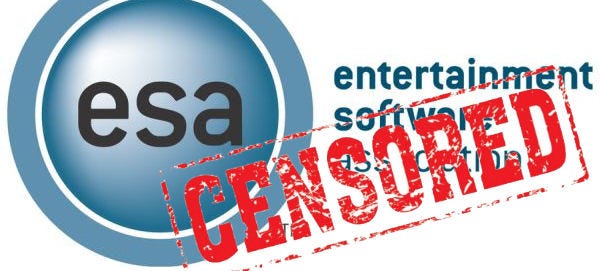RPS Asks ESA Members To Denounce SOPA
Protect Your Internet
You've probably heard of SOPA, the Stop Online Piracy Act, by now. It's the bill that is currently being considered in the US, that on the surface appears to be an attempt to control piracy, but with only the tiniest scrapes reveals a genuinely terrifying, draconian attempt to introduce government censorship of the internet at the behest of unelected corporations. While it initially had the support of a number of big internet players, that has rapidly ceased to be the case, with massive online corps pulling support or having refused it in the first place. From Facebook to Google, AOL to Yahoo, and so many other big players, the bill is being condemned as a threat to free speech, online business, any "safe harbor" protections that the DMCA had left behind, and being so poorly worded that it pretty much outlaws using the internet at all. So why is it the Entertainment Software Association is in support?
Clearly they're not alone. The list of supporters is as long as it is frightening, and unsurprisingly features all the usual players like the MPAA, RIAA, and so on.
This is an American bill, but it obviously wouldn't only affect America. Which is no small part of the massive issues surrounding it - it's a bill that will affect the whole world, most of which didn't get a vote for the responsible bodies. That's because its goal is to "prevent US support of foreign infringing sites". It would allow the US Department of Justice, and indeed any business with enough money, to seek a court order to have a website they claim is infringing copyright blocked from US access. This would mean service providers would have to,
(i) IN GENERAL- A service provider shall take technically feasible and reasonable measures designed to prevent access by its subscribers located within the United States to the foreign infringing site (or portion thereof) that is subject to the order, including measures designed to prevent the domain name of the foreign infringing site (or portion thereof) from resolving to that domain name’s Internet Protocol address. Such actions shall be taken as expeditiously as possible, but in any case within 5 days after being served with a copy of the order, or within such time as the court may order.
And search engines would be required to,
(B) INTERNET SEARCH ENGINES- A provider of an Internet search engine shall take technically feasible and reasonable measures, as expeditiously as possible, but in any case within 5 days after being served with a copy of the order, or within such time as the court may order, designed to prevent the foreign infringing site that is subject to the order, or a portion of such site specified in the order, from being served as a direct hypertext link.
Then payment sites and advertisers must too sever all links within five days of the court order. Which is to say, if a corporation claims that a site is infringing their copyright, then without that site's involvement at any level, it will be required by US law to be blocked from access, invisible on search engines, and be completely unknowable in the US. It makes China look like a haven of free and open speech.
Let's be absolutely clear. The SOPA is wrong. No matter anyone's position on piracy, it is not a relevant factor in this debate. The SOPA is so poorly worded that it makes something as simple as a proxy server illegal - an essential tool used by the Arab Spring uprising, for instance. The wording throughout the bill is melodramatic nonsense, screaming about "theft of US property" and other such terms that have no meaningful use in this matter. Its consequences could be so far reaching, and will inevitably see other world governments enacting the same, which will target US sites and businesses, making it far less likely that they will be able to trade overseas. It will see major US companies moving their servers, and possibly their entire businesses, out of the US such that they can continue to trade freely, without fear of the dangerously sloppy act.
The most immediately obvious issues come with any site that allows user content. Facebook, Twitter, Flickr, YouTube, Vimeo, and so on, could all face being blocked if their users violate the act. Each company would be liable for offending links, and the Electrionic Frontier Foundation has argued that many major sites will simply have to shut down should it be enforced. And blocking IPs, as the act will do, will mean any number of irrelevant and innocent sites will be lost too.
And yet the ESA has just made clear that it is in support of the bill. Which means, in turn, so is every major games publisher it represents. Which is all of them but Activision.
Techdirt posts the ESA statement, in which they make it clear that they have no problems with a bill that circumvents all the safe harbours offered by the already catastrophic Digital Millennium Copyright Act, that had previously ensured ISPs, search engines, etc, didn't have to actively police users.
"As an industry of innovators and creators, we understand the importance of both technological innovation and content protection, and do not believe the two are mutually exclusive. Rogue websites – those singularly devoted to profiting from their blatant illegal piracy – restrict demand for legitimate video game products and services, thereby costing jobs. Our industry needs effective remedies to address this specific problem, and we support the House and Senate proposals to achieve this objective. We are mindful of concerns raised about a negative impact on innovation. We look forward to working with the House and Senate, and all interested parties, to find the right balance and define useful remedies to combat willful wrongdoers that do not impede lawful product and business model innovation."
Never mind that there's not a scrap of evidence to support their claims about such sites costing jobs, because that's not the discussion here. The issue is, as they say, the industry believes it needs "effective remedies", and SOPA is no such thing. No matter what caveats are attached, unlike so many other major players they are willing to attach their name to the bill as it is. Which is made all the more bitter by the seeming hypocrisy pointed out by Destructoid's Jim Sterling. Last year, he observes, the ESA came begging to gamers to rescue it from the threat of receiving sales restrictions on games branded "violent". This attempt at censorship directly threatened their members' profits, and was eventually recognised as being in violation of the US's First Amendment. However, this time out their interests in "free speech" seem to be somewhat different, as their perceived threat to profits is reversed. It's pretty grotesque.
Other members of the gaming industry had previously been suggested to be in favour of the bill. On the 20th November, Joystiq were reporting that Apple and Microsoft were joining Nintendo, Sony and EA, to support it. This wasn't quite the case - Sony, Nintendo and EA had all said they'd support something like the bill, before it actually existed. However, after they'd read it, by 30th December and they stated they were against it. They were joined by the Business Software Alliance, who despite having issued a statement supporting the bill in October, had eventually noticed that it supports internet censorship which they were supposed to be against. Which also removes Apple's support.
But here's the problem. Nintendo, Sony, EA, Microsoft and so on are all represented by the ESA. So while they've all said they aren't supporting the bill, the reality is by their membership of the ESA, they are. Which means something has to be done.
Joystiq spotted Serious Sam DD developer, Mommy's Best Games, asking ESA members to speak out against the bill. And we'd like to join him.
We believe the internet is incredibly precious, and we're in terrible danger of taking it for granted. Allowing something like SOPA to go through is intolerable, and even though we're the other side of the world, it's something we believe we should fight against.
The ESA represents 34 publishers, and we'd like to see them all state publicly that they're against the SOPA, and thus make the ESA support meaningless. We will be contacting as many of them as we can to hear their position.
We've also contacted the UK industry bodies, TIGA and UKIE, to ask what position they're taking on the matter, and will update when we hear back from them.
UPDATE:
Epic have come out against SOPA, as reported by Joystiq. And 38 Studios have posted in a comment on their Facebook that they don't support it in its current form.




